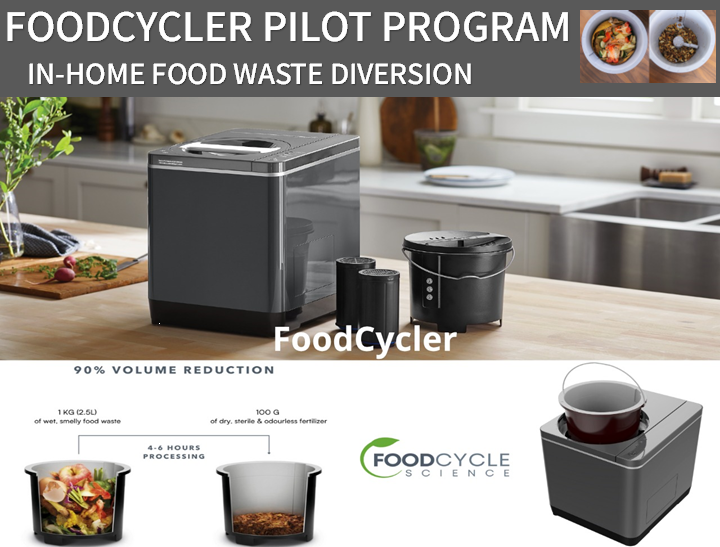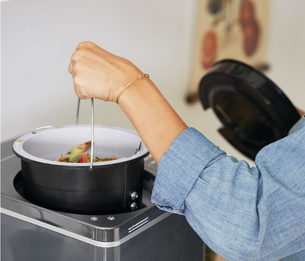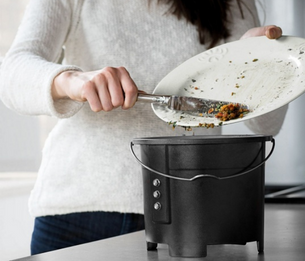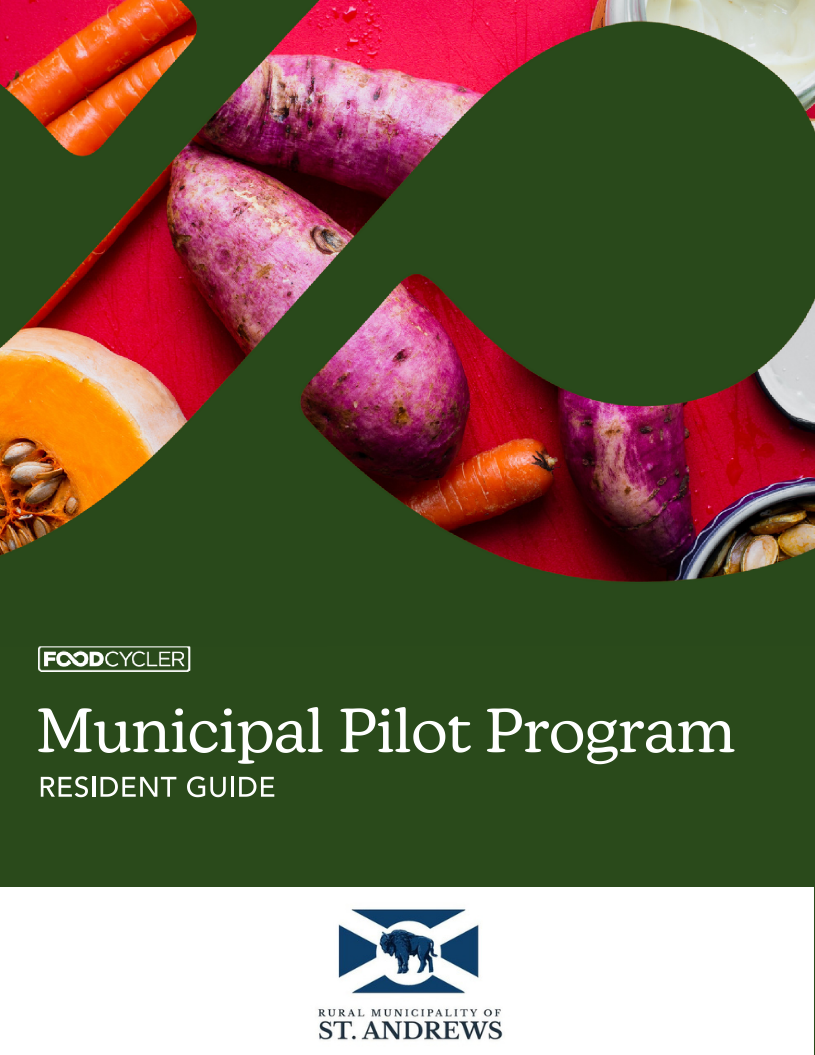
All FoodCycler Units have now been sold!
To see how one of these units works, you can check out this video.
What is a FoodCycler?
 The FoodCycler™ is a closed-loop indoor compost alternative, which speeds up the natural decomposition process through aerobic digestion of waste. The unit dries and grinds food waste into a dry, odorless nutrient rich by-product that is significantly reduced in weight and volume from its unprocessed state. The product is free from bacteria, weed seeds and food-borne pathogens that were eliminated during the process.
The FoodCycler™ is a closed-loop indoor compost alternative, which speeds up the natural decomposition process through aerobic digestion of waste. The unit dries and grinds food waste into a dry, odorless nutrient rich by-product that is significantly reduced in weight and volume from its unprocessed state. The product is free from bacteria, weed seeds and food-borne pathogens that were eliminated during the process.
Benefits of the FoodCycler™:
- Up to 90% volume reduction
- Quiet, compact, odourless operation
- Easy to clean, easy to operate, no special training or skills required
- Quick (compared to composting, the FoodCycler™ processes food waste in hours, instead of months)
- Produces a valuable soil amendment, low in odour and less attractive to wildlife.
- Reduces greenhouse gas (GHG) impact vs landfill.
FOODCYCLER pilot program
The R.M. of St. Andrews entered into an agreement with Food Cycle Science to establish a pilot program that would allow for 50 FoodCycler machines to be purchased by residents of the RM at a discounted cost in exchange for recording their usage over the course of the program. A 2nd in-take round was also done for another 50 units and all 100 units have sold.
All units that were purchased got distributed to residents and when the pilot program ended, the FoodCycler machines were theirs to keep!
 The pilot program ran for 12 weeks. Each household that received a FoodCycler was asked to track how many “cycles” they run their FoodCycler through each week. For example, if you fill your FoodCycler up with organic waste and run the machine once per day for a week, you will mark down that your ran your unit 7 times. This tracking allows FoodCycle Science and the RM to estimate the total waste diversion achieved over the 12 week pilot program. At the end of the 12 weeks, participants were asked to fill out an exit survey, providing their review of the program and any other feedback they may have. The survey results are used to evaluate the program success. The survey results from the first intake are listed below.
The pilot program ran for 12 weeks. Each household that received a FoodCycler was asked to track how many “cycles” they run their FoodCycler through each week. For example, if you fill your FoodCycler up with organic waste and run the machine once per day for a week, you will mark down that your ran your unit 7 times. This tracking allows FoodCycle Science and the RM to estimate the total waste diversion achieved over the 12 week pilot program. At the end of the 12 weeks, participants were asked to fill out an exit survey, providing their review of the program and any other feedback they may have. The survey results are used to evaluate the program success. The survey results from the first intake are listed below.
Food Cycle Science is looking to receive high-quality data from the pilot program participants regarding food waste diversion, as well as receive high-quality feedback from residents, staff, and Council regarding the feasibility of a FoodCycler™ food waste diversion program for the R.M. of St. Andrews and similar communities (data to be submitted to Impact Canada). It would also demonstrate the viability of the technology and solutions in a municipal setting so the model can be redeployed in other similar communities in Canada.
More details can be found in our Resident Guide.
November 21, 2023 Update
Earlier this year we launched the FoodCycler Pilot Program with FoodCycle Science which is a program for in-home food waste diversion. Several residents ordered these units and participated.
A presentation was made on November 20, 2023 to Council showcasing the results of this program.
You can view the survey results presentation here.
What is a FoodCycler?
The FoodCycler™ is a closed-loop indoor compost alternative, which speeds up the natural decomposition process through aerobic digestion of waste. The unit dries and grinds food waste into a dry, odourless, nutrient-dense by-product that is significantly reduced in weight and volume from its unprocessed state. The end product is free from bacteria, and weed seeds and food-borne pathogens are eliminated in the process.
What is the Pilot Project all about? What do I need to do if I elect to participate?
You will need to track use of your FoodCycler unit for a 12 week trial period. During this time you can use the unit as much or as little as you need or want. You are required to track how often you run the FoodCycler (i.e. how many cycles). You will be provided with a simple tracking sheet when you receive your unit.
At the end of 12 weeks there will be another quick survey you are required to complete. The survey shouldn’t take more than 10-15 minutes to complete and will be comprised mostly of multiple choice questions related to your experience using the FoodCycler and your waste management practices.
Why should I participate?
Did you know 50% of household waste is composed of food waste? By helping the municipality address food waste, you are supporting the community’s environmental initiatives, while reducing your carbon footprint. Check out this FoodCycler Video and see how it works.
How much does it cost?
Residents are receiving these units at a significant subsidized cost. The cost to purchase through this program is:
- Foodcycler FC-30 (2L) - $150 CAD (plus HST)
- Foodcycler Maestro (5L) - $300 CAD (plus HST)
Residents will be advised when the unit is ready for pickup. On-line payment will be required once you have been notified as being one of the first 50 registrants.
What should I cycle?
The best cycle is one with a lot of variety. Please check out the last 2 pages of our Resident Guide for a general list of what you can and cannot process in each of the FoodCyclers™.
How much energy does the unit consume?
Each cycle consumes approximately 0.8-1.5 kWh per cycle, which is roughly equivalent to having a desktop computer running for the same amount of time as the cycle. Depending on where you live, using the FoodCycler™ regularly should not cost you more than $2-$4 per month.
The FoodCycler™ has built-in sensor technology that monitors the dryness and humidity of the food waste. Once complete, the unit will stop the cycle automatically.
Where can I store my FoodCycler™?
Nearly any covered area with access to an outlet. The FoodCycler™ must be in a closed, dry environment where there is no risk of it being rained on or otherwise subjected to the elements. Possible locations include heated garages, basements, pantries, or your kitchen.
How long will my filters last?
The carbon filters last between 3-4 months with regular use, or 500 cycle hours. The life expectancy of the carbon filters is determined by the moisture content of the food waste, and the natural odours of the food waste. Denser, wetter and smellier food wastes will go through filters much faster than simple veggie scraps and egg shells. The filter light sensor is a guide only - the best indication of whether your filters require replacement is odour. Please see your device manual for instructions to reset the filter light.
How long does the cycle last?
In the FoodCycler™ Maestro™, a typical cycle takes between 4-9 hours for the food waste to become completely dehydrated and processed into the by-product.
For the FC-30 units it takes 4-8 for the food waste to become completely dehydrated and processed. The time needed depends on the amount of food waste being processed, the density of the food wastes and the moisture levels contained in each. Please note that these estimates exclude the unit's cooling time which lasts less than a half hour on average.
Are these FoodCycler machines covered under warranty?
Yes these FoodCycler machines are covered under warranty.